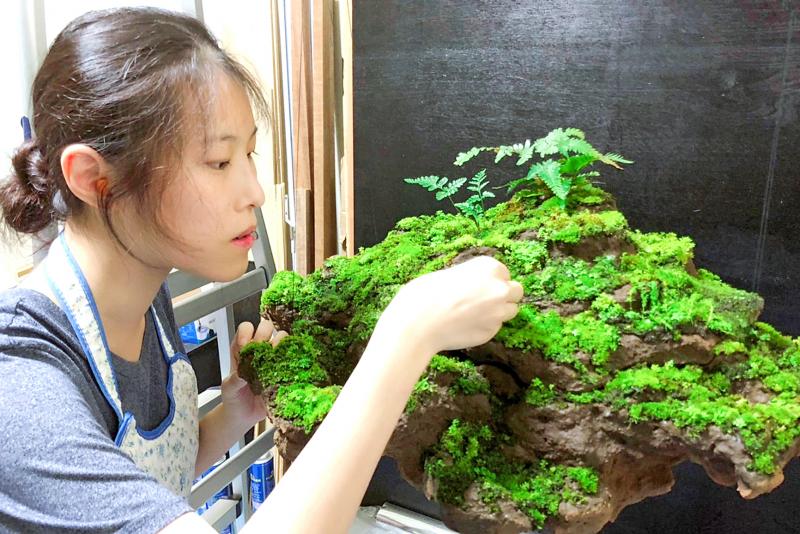Unable to hold an in-person summer camp this year, a doctoral student has designed a virtual camp where disadvantaged students can not just learn about, but also practice biology, music, programming and more, free of charge.
Born in Taichung’s remote Sinshe District (新社), Chou Chiao-chi (周巧其) knows what it is like to lack certain resources and the time to use them.
Chou recalled how many of her classmates had to collect mushrooms for their families after class, earning only NT$12 to NT$16 per basket.

Photo courtesy of National Tsing Hua University via CNA
To help students experiencing similar conditions, she spends most summers holding summer camps for disadvantaged children.
Many might view the shift to online classes this year due to the COVID-19 outbreak as a blow, but Chou saw an opportunity.
“This is a chance to expand the multicultural knowledge of young people in remote areas,” she said.
Chou’s vision has culminated in a virtual summer camp with six classes on an array of topics that focus on experiential learning.
Ten teachers from Taiwan and the US are to offer six two-week courses throughout the summer, starting on July 19.
The first course is to be led by Chou, now a doctoral student in National Tsing Hua University’s Department of Life Science.
Each student is to be sent petri dishes before the course begins to cultivate mold and study the microorganisms inside, after which they are to create small science projects based on their observations.
Chou has invited two fellow doctoral students from Tsing Hua and Stanford University to supplement the curriculum.
A course on fashion design aims to introduce the students to fibers, fabrics and modes of expression.
Each participant is to be sent a package of easy-to-use paper materials for the class, and would be encouraged to collect materials around their home, such as bamboo, to try weaving.
In another class, experts from New York University and the Kaohsiung City Wind Orchestra are to lead students in creating ringtones, jingles and popular music on computer software, while students in another course are to create their own animated characters by using Autodesk Maya.
In the last class, a University of Taipei doctoral student is to bring theater training to the virtual classroom as the students learn how to recognize the muscles of the human body, practice balance and choreograph to music.
Registration is open until Saturday next week for children aged 12 to 14.
Due to limited materials, each course is limited to 15 students from remote areas and low or middle-income families, as well as those with special circumstances.
The courses are open to children of frontline medical workers in gratitude for their service.

Taipei has once again made it to the top 100 in Oxford Economics’ Global Cities Index 2025 report, moving up five places from last year to 60. The annual index, which was published last month, evaluated 1,000 of the most populated metropolises based on five indices — economics, human capital, quality of life, environment and governance. New York maintained its top spot this year, placing first in the economics index thanks to the strength of its vibrant financial industry and economic stability. Taipei ranked 263rd in economics, 44th in human capital, 15th in quality of life, 284th for environment and 75th in governance,

The Sports Administration yesterday demanded an apology from the national table tennis association for barring 17-year-old Yeh Yi-tian (葉伊恬) from competing in the upcoming World Table Tennis (WTT) United States Smash tournament in Las Vegas this July. The sports agency said in a statement that the Chinese Taipei Table Tennis Association (CTTTA) must explain to the public why it withdrew Yeh from the WTT tournament in Las Vegas. The sports agency said it contacted the association to express its disapproval of the decision-making process after receiving a complaint from Yeh’s coach, Chuang

Control Yuan Secretary-General Lee Chun-yi (李俊俋) tendered his resignation last night, admitting that he had misused a government vehicle, as reported by media. His resignation was immediately accepted by the Control Yuan. In a statement explaining why he had resigned, Lee apologized for using a Control Yuan vehicle to transport his dog to a pet grooming salon on May 20. The issue first came to light late last month, when TVBS News reported that Lee had instructed his driver to take the dog to the salon. The news channel broadcast photos that it said were taken by an unnamed whistle-blower, which purportedly showed the

A former officer in China’s People’s Liberation Army (PLA) who witnessed the aftermath of the 1989 Tiananmen Square massacre has warned that Taiwan could face a similar fate if China attempts to unify the country by force. Li Xiaoming (李曉明), who was deployed to Beijing as a junior officer during the crackdown, said Taiwanese people should study the massacre carefully, because it offers a glimpse of what Beijing is willing to do to suppress dissent. “What happened in Tiananmen Square could happen in Taiwan too,” Li told CNA in a May 22 interview, ahead of the massacre’s 36th anniversary. “If Taiwanese students or